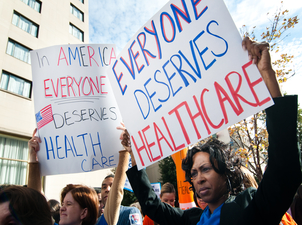
The Forgotten Ones
Maria Gomez and Bibi Hidalgo
June 5, 2020
The majority of eligible Americans have now received stimulus checks through the CARES Act, except for the excluded workers — the forgotten ones — who we depend on in many facets of our lives. These forgotten — but essential — workers pick the ripe fruits we eat; they cook the warm meals at our favorite take-out restaurants; and they sanitize checkout devices at grocery stores late into the night so that we will be less afraid of COVID-19 when we shop. Regardless of their legal status, they disinfect our surroundings and feed us.
As one of the 1,400 Community Health Centers across the country that serves families below the poverty line, Mary’s Center in the Washington, D.C. region is on the frontlines of this crisis. We have seen the health and job insecurity that our nation now confronts through the eyes of the 60,000 adults and children we have served annually since 1988. Each day the people who reach out to us are seeking life-saving medicines, health care, shelter, food and income. Our telemedicine team ensures that line cooks and sanitation workers have access to hypertension and asthma medications. Our counselors talk with them when they experience emotional hardships. Thousands of people — 54,000 to be exact — had a total of 270,000 visits to our five centers in 2018 and that number is now growing significantly.
Across the U.S., community health centers serve 29 million people, which is close to 10 percent of the population. No hospital system in the U.S. serves a number that size. Yet as it stands today, millions of low-wage workers and their families are in danger of collapse, unless we can work together as a whole society — philanthropy and big business, local and state government, families and communities — to ensure everyone overcomes the COVID-19 crisis and that we build a more resilient society.
In the absence of a unifying government, we need to do this ourselves.
We can accomplish this by having federally qualified community health centers in major cities partner with business executives and philanthropies to create a national plan that will stem this crisis and help rebuild the country. Last week Congress passed another stimulus measure providing small businesses loans through the Paycheck Protection Program. It remains to be seen whether any of the small and micro-businesses in our community that hire our clients gain access to the program. Up until now that hasn’t been the case. In the meantime, their workers are facing the despair of day-to-day survival.
National nonprofits, foundations and government bodies are having urgent calls daily to determine how they can provide relief to community organizations in addition to any stimulus operating support. If the 2008 financial crisis is any lesson though, it is time we flip the script and have community organizations lead the national conversation about what is sorely needed.
Ten million families still lost their homes despite the 2.7 million families who benefited from mortgage modifications supported by the 2008 Troubled Asset Relief Program, which took a top-down approach to problem-solving. By the time resources arrived to community organizations providing housing counseling to Latinx and African-American families who had been misled by lenders to take out subprime mortgages, it amounted to table crumbs that did not leverage local knowledge of how to build trust, engage and serve the most economically vulnerable.
Community Health Centers across the nation are eager to collaborate with the private sector and state and local governments to find solutions. We can help large corporations track the patterns we see on the ground with the pandemic and the resources that are needed to rebuild communities and ultimately a robust economy. Pharmaceutical companies can ensure that frontline community health centers across the United States have a steady supply of diabetes, asthma and life-saving medications available. Health care distributors can ensure we have medical supplies, such as masks, bandages and thermometers.
Together with major grocery chains and wholesale companies, we can ensure that low-wage workers who did not receive a stimulus check have provisions to feed their families. By working together, we can create a stabilization supply-chain to feed, clothe and shelter the forgotten ones. The ones who are ultimately indispensable to you, me and all of us as a nation.
Maria Gomez is president and CEO of Mary’s Center, a Washington D.C. region Community Health Center, and Presidential Citizen Awardee @MarysCenter.
Bibi Hidalgo is co-founder of Future Partners LLC and served as an economic policy appointee in the Obama White House and U.S. Treasury @BibiHidalgo.
Originally published at TheHill.com.







